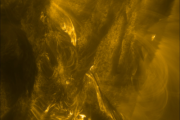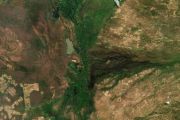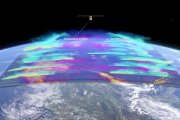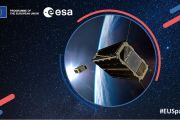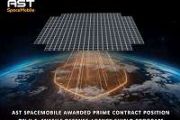
Copernical Team
Webb's mid-infrared spectroscopy will reveal molecules, elements

Evan Leppink: Seeking a way to better stabilize the fusion environment
 "Fusion energy was always one of those kind-of sci-fi technologies that you read about," says nuclear science and engineering PhD candidate Evan Leppink. He's recalling the time before fusion became a part of his daily hands-on experience at MIT's Plasma Science and Fusion Center, where he is studying a unique way to drive current in a tokamak plasma using radiofrequency (RF) waves.
Now, a
"Fusion energy was always one of those kind-of sci-fi technologies that you read about," says nuclear science and engineering PhD candidate Evan Leppink. He's recalling the time before fusion became a part of his daily hands-on experience at MIT's Plasma Science and Fusion Center, where he is studying a unique way to drive current in a tokamak plasma using radiofrequency (RF) waves.
Now, a NASA, ESA finalize agreements on climate, 1 cooperation
 NASA Administrator Bill Nelson and ESA Director General Josef Aschbacher signed two agreements Wednesday at the ESA Council meeting in Noordwijk, Netherlands, further advancing the space agencies' cooperation on Earth science and Artemis missions.
"With these two agreements, NASA and ESA are strengthening the relationship on two of our agencies' primary mission areas: Artemis and Earth sci
NASA Administrator Bill Nelson and ESA Director General Josef Aschbacher signed two agreements Wednesday at the ESA Council meeting in Noordwijk, Netherlands, further advancing the space agencies' cooperation on Earth science and Artemis missions.
"With these two agreements, NASA and ESA are strengthening the relationship on two of our agencies' primary mission areas: Artemis and Earth sci German radar satellite TerraSAR-X - 15 years in space and still in perfect shape
 Fifteen years - who would have thought it? The German radar satellite TerraSAR-X, which was launched from the Baikonur Cosmodrome in Kazakhstan at 08:14 local time on 15 June 2007, was originally designed to last five and a half years - until the end of 2012. It has been delivering data of outstanding quality ever since, regardless of weather conditions, cloud cover and daylight levels. The scie
Fifteen years - who would have thought it? The German radar satellite TerraSAR-X, which was launched from the Baikonur Cosmodrome in Kazakhstan at 08:14 local time on 15 June 2007, was originally designed to last five and a half years - until the end of 2012. It has been delivering data of outstanding quality ever since, regardless of weather conditions, cloud cover and daylight levels. The scie China's deep space exploration laboratory starts operation
 China's deep space exploration laboratory has started operations, the China National Space Administration (CNSA) said Tuesday.
Co-established by the CNSA, Anhui Province and the University of Science and Technology of China, the laboratory is headquartered in Hefei, capital city of Anhui.
It has completed various preparatory work and entered a new stage of substantial operation and c
China's deep space exploration laboratory has started operations, the China National Space Administration (CNSA) said Tuesday.
Co-established by the CNSA, Anhui Province and the University of Science and Technology of China, the laboratory is headquartered in Hefei, capital city of Anhui.
It has completed various preparatory work and entered a new stage of substantial operation and c Northrop Grumman runs Laser Communication Demonstration for Tranche 1 constellation
 Northrop Grumman Corporation has announced the successful ground demonstration of a secure networked laser communications system for proliferated-LEO constellations supporting the U.S. military.
Performed for SDA leadership, the demonstration validated compatibility between commercially developed laser communication and secure U.S. government encryption hardware, providing a baseline for N
Northrop Grumman Corporation has announced the successful ground demonstration of a secure networked laser communications system for proliferated-LEO constellations supporting the U.S. military.
Performed for SDA leadership, the demonstration validated compatibility between commercially developed laser communication and secure U.S. government encryption hardware, providing a baseline for N Airbus built MEASAT-3d communications satellite ready for launch
 The Airbus built MEASAT-3d telecommunications satellite is in Kourou, French Guiana and is ready for its launch on an Ariane 5 on 22 June 2022.
MEASAT-3d is the 57th E3000 satellite built by Airbus and will be positioned at the 91.5E orbital slot and collocated with MEASAT-3b, also built by Airbus.
This new satellite will significantly enhance broadband speeds of up to 100 Mbps in ar
The Airbus built MEASAT-3d telecommunications satellite is in Kourou, French Guiana and is ready for its launch on an Ariane 5 on 22 June 2022.
MEASAT-3d is the 57th E3000 satellite built by Airbus and will be positioned at the 91.5E orbital slot and collocated with MEASAT-3b, also built by Airbus.
This new satellite will significantly enhance broadband speeds of up to 100 Mbps in ar SCEYE HAPS ascends to stratosphere demonstrates ability to stay over area of operation
 Sceye, a manufacturer of High-Altitude Platform Stations (HAPS), announced that it reached the stratosphere with the aim of demonstrating the ability to stay over an area of operation for months at a time using renewable energy sources.
The milestone test launch, which is using patented solar and battery power, puts Sceye on track to expand internet access to remote populations, monitor gr
Sceye, a manufacturer of High-Altitude Platform Stations (HAPS), announced that it reached the stratosphere with the aim of demonstrating the ability to stay over an area of operation for months at a time using renewable energy sources.
The milestone test launch, which is using patented solar and battery power, puts Sceye on track to expand internet access to remote populations, monitor gr Week in images: 13-17 June 2022

Week in images: 13-17 June 2022
Discover our week through the lens
Earth from Space: Glacier Bay, Alaska

Part of the Glacier Bay National Park and Preserve, which lies along the coast of southeast Alaska, is featured in this image captured by the Copernicus Sentinel-2 mission.







